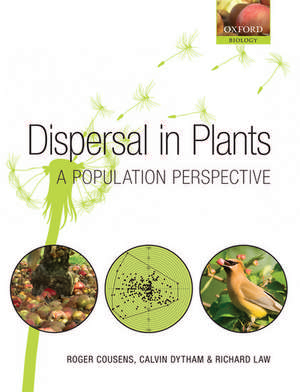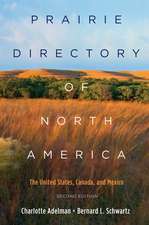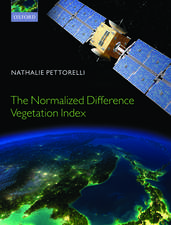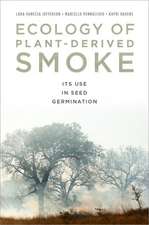Dispersal in Plants: A Population Perspective
Autor Roger Cousens, Calvin Dytham, Richard Lawen Limba Engleză Paperback – 5 mar 2008
Preț: 437.98 lei
Preț vechi: 538.37 lei
-19% Nou
Puncte Express: 657
Preț estimativ în valută:
83.82€ • 86.59$ • 69.76£
83.82€ • 86.59$ • 69.76£
Carte tipărită la comandă
Livrare economică 15-21 martie
Preluare comenzi: 021 569.72.76
Specificații
ISBN-13: 9780199299126
ISBN-10: 0199299129
Pagini: 240
Ilustrații: 64 line and 6 halftone illustrations
Dimensiuni: 189 x 246 x 12 mm
Greutate: 0.53 kg
Editura: OUP OXFORD
Colecția OUP Oxford
Locul publicării:Oxford, United Kingdom
ISBN-10: 0199299129
Pagini: 240
Ilustrații: 64 line and 6 halftone illustrations
Dimensiuni: 189 x 246 x 12 mm
Greutate: 0.53 kg
Editura: OUP OXFORD
Colecția OUP Oxford
Locul publicării:Oxford, United Kingdom
Recenzii
This is a well structured book that has been much needed for some years and provides a modern analytical approach to a subject that is as old as botany itself.
The greatest value of this book is that it focuses on dispersal as a fundamental biological process. A vast literature on mating systems explores their evolution and how they influence population dynamics, gene flow, and adaptation. In comparison, the literature on seed dispersal, as opposed to pollen dispersal, is oddly scarce. Cousens et al.'s book is a good step toward remedying this.
This book is highly recommended for plant and weed ecologists interested in plant population dynamics.
The book is very timely and current summary of the present state in dispersal research.
Overall, Dispersal in plants: a population perspective is an excellent work, and a valuable addition to the plant ecologist's bookshelf. It would be suitable for both a graduate and advanced undergraduate students, as well as for anyone seeking an enjoyable, well-written introduction to the growing field of dispersal biology.
Although the authors aimed this book at graduate students in plant ecology, plant scientists and ecologists, I recommened it to all weed scientists and agronomists as well.
The greatest value of this book is that it focuses on dispersal as a fundamental biological process. A vast literature on mating systems explores their evolution and how they influence population dynamics, gene flow, and adaptation. In comparison, the literature on seed dispersal, as opposed to pollen dispersal, is oddly scarce. Cousens et al.'s book is a good step toward remedying this.
This book is highly recommended for plant and weed ecologists interested in plant population dynamics.
The book is very timely and current summary of the present state in dispersal research.
Overall, Dispersal in plants: a population perspective is an excellent work, and a valuable addition to the plant ecologist's bookshelf. It would be suitable for both a graduate and advanced undergraduate students, as well as for anyone seeking an enjoyable, well-written introduction to the growing field of dispersal biology.
Although the authors aimed this book at graduate students in plant ecology, plant scientists and ecologists, I recommened it to all weed scientists and agronomists as well.
Notă biografică
Roger Cousens is a Professor in the School of Resource Management School, University of Melbourne, Australia. He has published for over 20 years on ecology and population dynamics of weeds (including dispersal), especially on methodology. He worked at the Weed Research Organisation and Long Ashton Research Station (UK) before moving to Australia in 1989; since then he has lectured at University of Sydney, headed the weed science department of Agriculture Western Australia, and been the Chair of Plant and Soil Science and head of School of Agricultural Science at La Trobe University. Since 1998 he has been professor and formerly head of the School of Resource Management at University of Melbourne. His current research is on dispersal, spatial pattern and population dynamics, from established agricultural weeds, to new plant invasions and endangered orchids. He also researches on the history of botanic gardens.Calvin Dytham is a Marie Curie More Senior Research Fellow at the University of Potsdam, Germany and a Senior Lecturer in Ecology at the University of York, UK. After completing a BSc in ecology and PhD from the University of Leeds, he took a postition at Imperial College, Silwood Park before returning to Leeds. He has been at the University of York since 1993 with a research fellowship in Potsdam 2006/7. His current research continues a long interest in the evolution of dispersal.Richard Law is a Professor in the Biology Department at the University of York. He obtained a BA from the Univeristy of York and a PhD from the University of Liverpool. He worked as a lecturer in Botany at Sheffield University and at the University of York, and as a guest scientist at the Forschungszentrum Julich Germany and that the Wissenschaftskolleg in Berlin. He has broad interests in ecological theory including plant community ecology and spatio-temporal processes in plant population dynamics.








